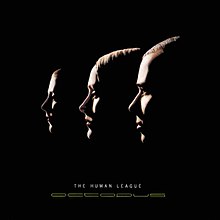| Octopus | ||||
|---|---|---|---|---|
 | ||||
| Studio album by | ||||
| Released | 23 January 1995[1] | |||
| Recorded | 1994–1995 | |||
| Length | 45:12 | |||
| Label | East West | |||
| Producer | Ian Stanley | |||
| The Human League chronology | ||||
| ||||
| Singles from Octopus | ||||
| ||||
| Review scores | |
|---|---|
| Source | Rating |
| AllMusic | |
| Chicago Tribune | |
| Entertainment Weekly | B−[4] |
| The Guardian | |
| NME | 7/10[6] |
| Q | |
| Rolling Stone | |
| The Rolling Stone Album Guide | |
| Select | 2/5[10] |
| Smash Hits | 2/5[11] |
Octopus is the seventh full-length studio album recorded by the British synth-pop band The Human League. It was produced by the former Tears for Fears keyboard player Ian Stanley and released by EastWest Records in 1995. It was the first new album from The Human League in five years after the termination of their long-term contract with Virgin Records. Octopus was the first Human League album that presented the band as a trio consisting of the singers Philip Oakey, Joanne Catherall and Susan Ann Sulley. The former Human League member Jo Callis and keyboard player Neil Sutton also contributed to the writing of the album.
The album's sound is notable for almost exclusively featuring analogue synthesizers, a marked change from the band's primarily "digital" sound in the mid-to-late 1980s.
- ^ The Human League Discography at League-Online
- ^ Ruhlmann, William. "The Human League: Octopus". AllMusic. Retrieved 8 December 2020.
- ^ Webber, Brad (15 June 1995). "Human League Octopus (eastwest)". Chicago Tribune. Archived from the original on 4 March 2016. Retrieved 3 July 2013.
- ^ Jones, Anderson (5 May 1995). "Music Review: 'Octopus' (1995)". Entertainment Weekly. Archived from the original on 29 August 2008. Retrieved 4 June 2013.
- ^ Sullivan, Caroline (27 January 1995). "Probably not CD of the week: The Human League". The Guardian. p. T.013.
- ^ Sutherland, Steve (21 January 1995). "Doing It For The Squids". NME. p. 37.
- ^ Collins, Andrew (January 1995). "The Human League: Octopus". Q. No. 100.
- ^ Evans, Paul (4 May 1995). "Rollin' & tumblin' – Octopus by The Human League". Rolling Stone. No. 707. p. 69.
- ^ Considine, J. D. (2004). "The Human League". In Brackett, Nathan; Hoard, Christian (eds.). The New Rolling Stone Album Guide (4th ed.). Simon & Schuster. pp. 397–98. ISBN 0-7432-0169-8.
- ^ Pattenden, Sian (January 1995). "New Albums". Select (55): 83. Retrieved 24 July 2013.
- ^ Cross, Tony (1 February 1995). "New Albums". Smash Hits (422): 57.